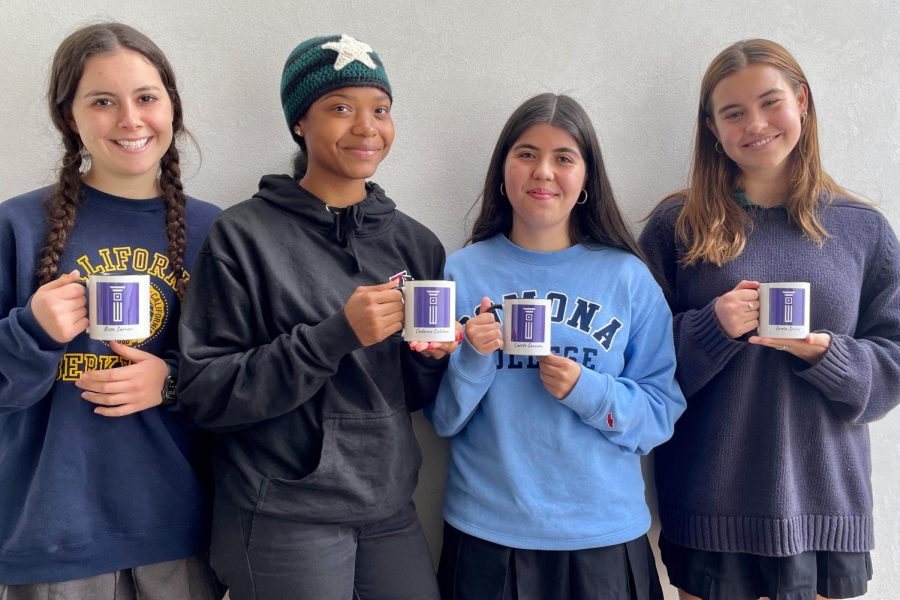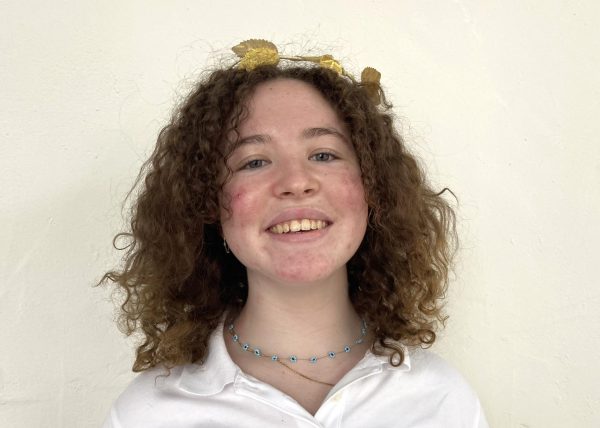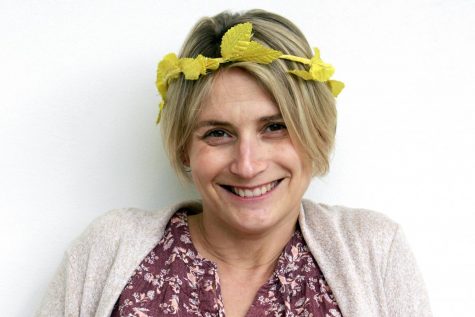Q&A with features editor and voices editor on freedom of speech and censorship
Photo credit: Kristin Taylor
Culture Editor Rose Sarner (’23), Voices Editor Cadence Callahan (’23), Features Editor Lizette Gonzalez (’23) and Editor-in-Chief Greta Irvine (’23) hold mugs given to them by journalism adviser Kristin Taylor during The Oracle’s senior celebration and new editor induction ceremony May 16. “It speaks volumes that we can say, ‘I want to write about this,’ and no one says no,” Gonzalez said.
June 1, 2023
Although students in the U.S. have freedom of expression, they continue to face limitations to their First Amendment rights, particularly student journalists.
As stated in The Oracle’s Staff Manual of 2022-2023, The Oracle’s staff and editorial board may seek advice about content from Archer’s administration, however, the administration does not review, censor or veto student journalistic content prior to, during or after publication. Although Archer student publications have complete press freedom and make all final decisions on content, student journalists in other Los Angeles schools still face censorship even though, according to California Education Code 48907, they legally should not.
As their third and final year on The Oracle ended, Features Editor Lizette Gonzalez (’23) and Voices Editor Cadence Callahan (’23) discussed censorship, freedom of speech and the importance of student journalism.
What do you see as The Oracle’s role at Archer and generally?
Lizette Gonzalez [LG]: What The Oracle stands for and what I have [stood] for since I’ve been with The Oracle is amplifying the most voices as possible. In our newspaper, what drove me to be in an editorial position was there were a lot of gaps in our coverage. I wanted to [be] in a position that helped me write articles that represented every group here at Archer, and even outside of Archer, and encourage other reporters to do the same. That’s the role journalism serves: telling stories, but telling stories from every point of view.
Cadence Callahan [CC]: I 100% echo that. Speaking to my role as voices editor, I’m there to amplify students’ voices. I want people to be able to come to my section and write about an array of topics, whether that’s something as serious as gun control or the stigmatization of people [with] queer parents, etc. It’s important to have a space where people can express themselves in a multitude of ways, and a community can be receptive to that. We’re putting information out there, amplifying voices … and allowing people to truly express their opinions unfiltered.
How have you seen students’ freedom of speech being impacted recently in the US?
[CC]: I don’t have a specific example of censorship happening at Archer, but we’ve read articles in class about other schools not being able to publish stories or teachers getting in trouble for allowing [students] to publish certain [stories]. It’s honestly really disheartening to hear because the whole purpose of student journalism is to get students interested in the craft of reporting, making stories, doing interviews. To put a ban or limit on what they can write about really contradicts the message of journalism in its entirety, and it ultimately can shun people away from even wanting to participate … in journalism itself.
[LG]: In reference to the story Maia and I are working on, the food stipends article, that was a harder topic — I guess a little bit more controversial topic that I’ve ever covered on The Oracle in my three years. It shows the power in writing those stories … because it’s considered controversial, it showcases why we should be publishing it in the first place, because it shouldn’t be something that is considered in that way.
[CC]: When you’re writing a difficult topic and you publish it and there’s discourse, conversation, maybe even controversy about the piece being published, it can serve as a learning opportunity. With pieces that are controversial that teachers [or] faculty might want to censor, that’s when you should really look at the article. You should really read it, and you should really understand its importance, maybe talk to the reporters, talk to the people that did interviews for the piece because pieces where there’s so much pushback are important. You have to take a closer look at them and use them as a learning experience to learn about why journalism [is] so crucial.
Why should students still be worried about the future of free speech in schools?
[LG]: Even if it’s not directly affecting us, if we don’t care, then we’re desensitized … If we become desensitized or take for granted the rights we do have, we miss the red flags when it’s happening to us … If we don’t care for that, first… it lacks empathy for the people that are experiencing [censorship]. Also, in my own mind, I was thinking I’m staying in California, but a lot of people in our grade are moving to the states [that] are banning drag shows or banning … Critical Race Theory. It’s going to be in our lives no matter what, no matter if we stay here, it’s something that needs to be talked about. If it doesn’t get talked about, then we’re allowing and enabling it and we’re not advocating for the people who can’t advocate for themselves.
[CC]: I don’t want to sound corny, but it definitely goes against our Amendments. We have freedom of speech, so to say we have freedom of speech, and it is written on paper and something everyone understands, but then to go on the other side of that and say, “We’re going to censor this, and you can’t talk about these things, and you have to make these people look good” completely contradicts that … In terms of states banning things like books or Critical Race Theory, we have to report about those things, talk about those things, to prevent them from happening again. Going back to what I said earlier… it’s just education and trying to better our society by informing them about things they’re not keen on or aware of.
Is there anything to be hopeful about for the future of student journalism or free speech?
[LG]: I have a lot of hope in our generation. We’re more vocal about things than previous generations. I feel like it’s not that they didn’t want to [be vocal], but there was a lot of fear … I think our generation is more willing to advocate for things they don’t agree with and are not caring if it’s breaking the rules or breaking the status quo. They don’t care; we’re just advocating for [changing] what is wrong in our eyes, and that’s what’s bringing me hope is our generation is pushing boundaries and making people feel uncomfortable, and I think that’s what we all need.
[CC]: I’m really excited for what [the new Editorial Board] will do next year and the years in the future. I’ve seen all of them, whether that’s in staff meetings or the classroom, and I understand how much they truly value journalism and sharing information with our community [and] with people that read our site that aren’t at Archer. I’m really excited for the reporting that they do. Lizette and Maia, you guys are definitely paving the way to talk about difficult topics, so I hope there are reporters or editors next year that feel comfortable taking on difficult, controversial, uncomfortable stories and are able to truly express themselves and inform our community.










